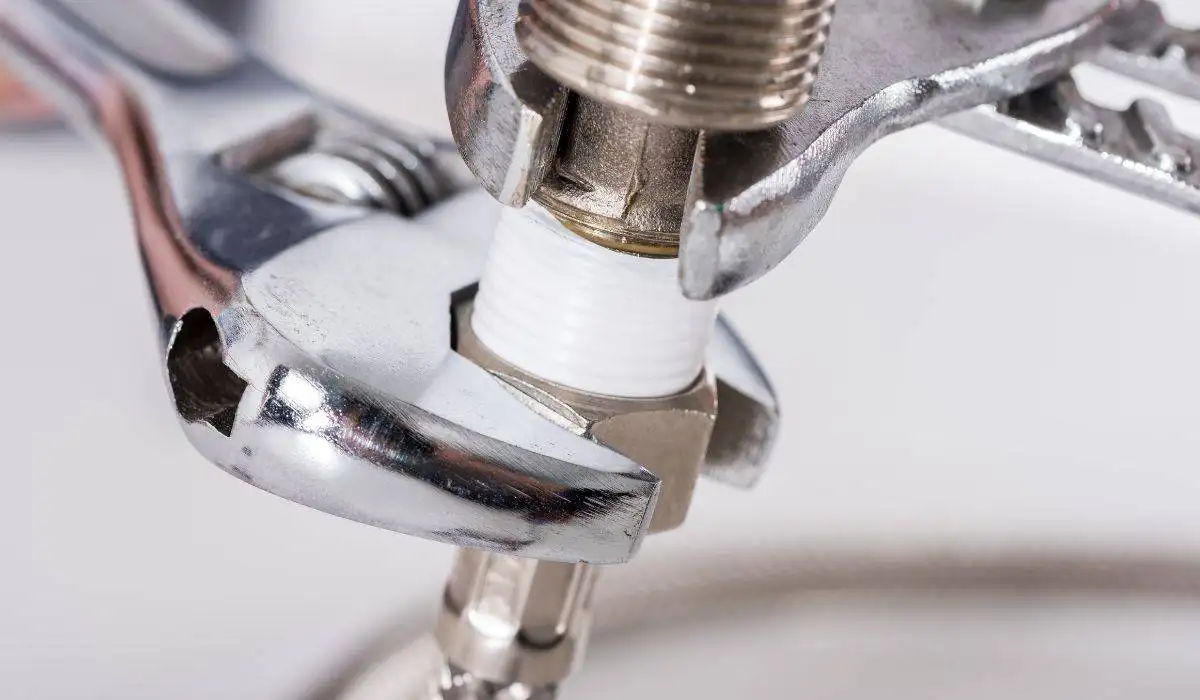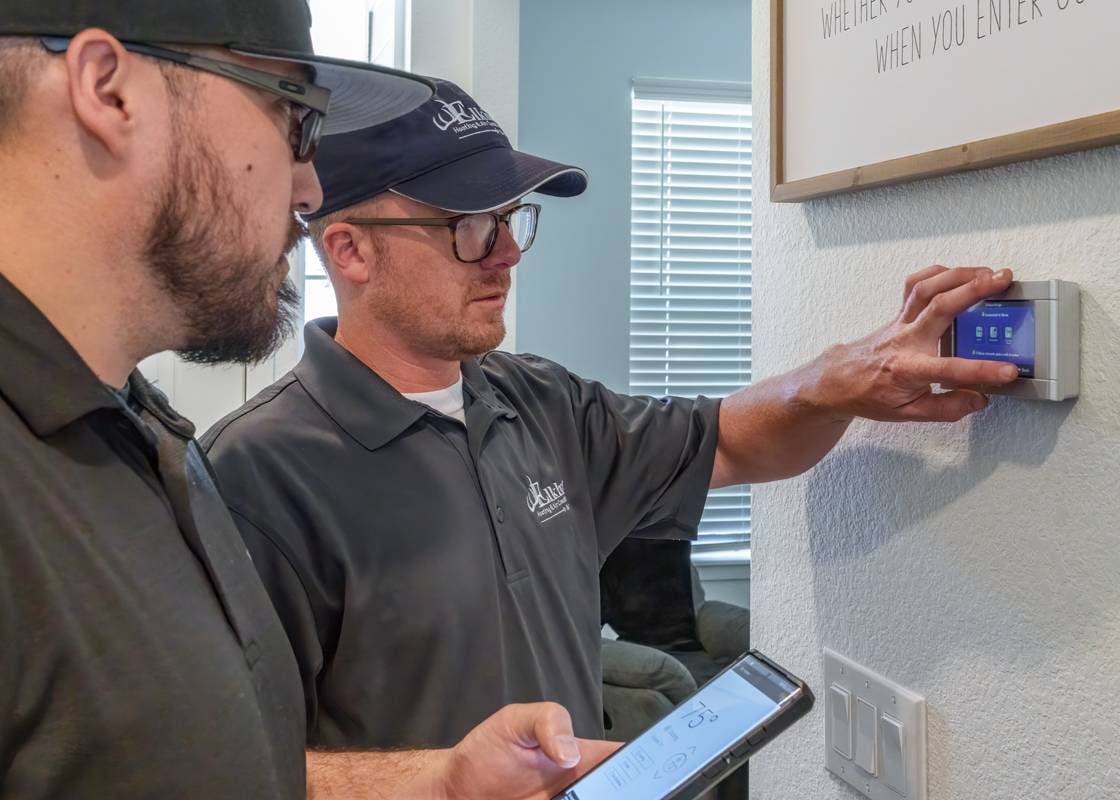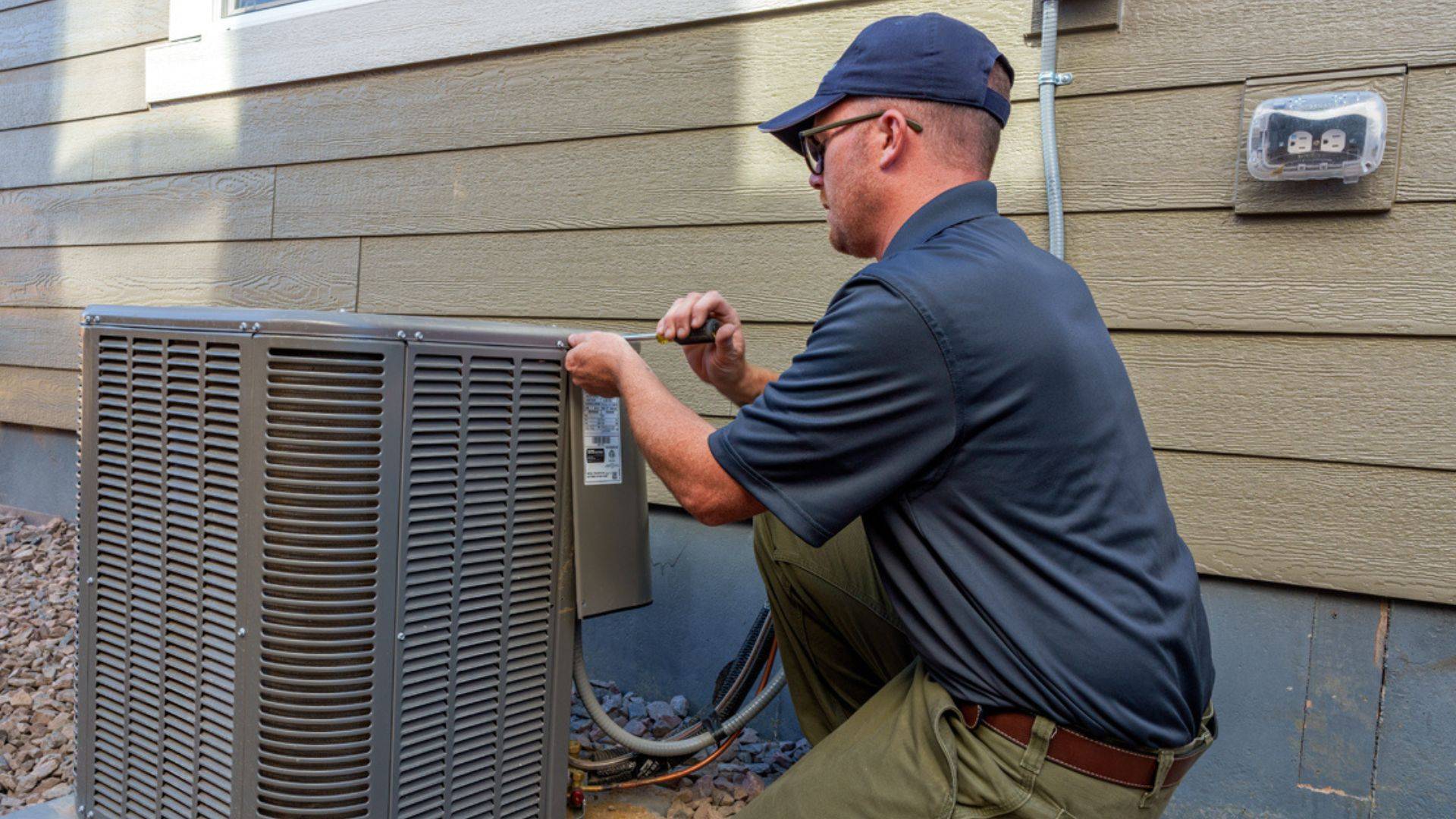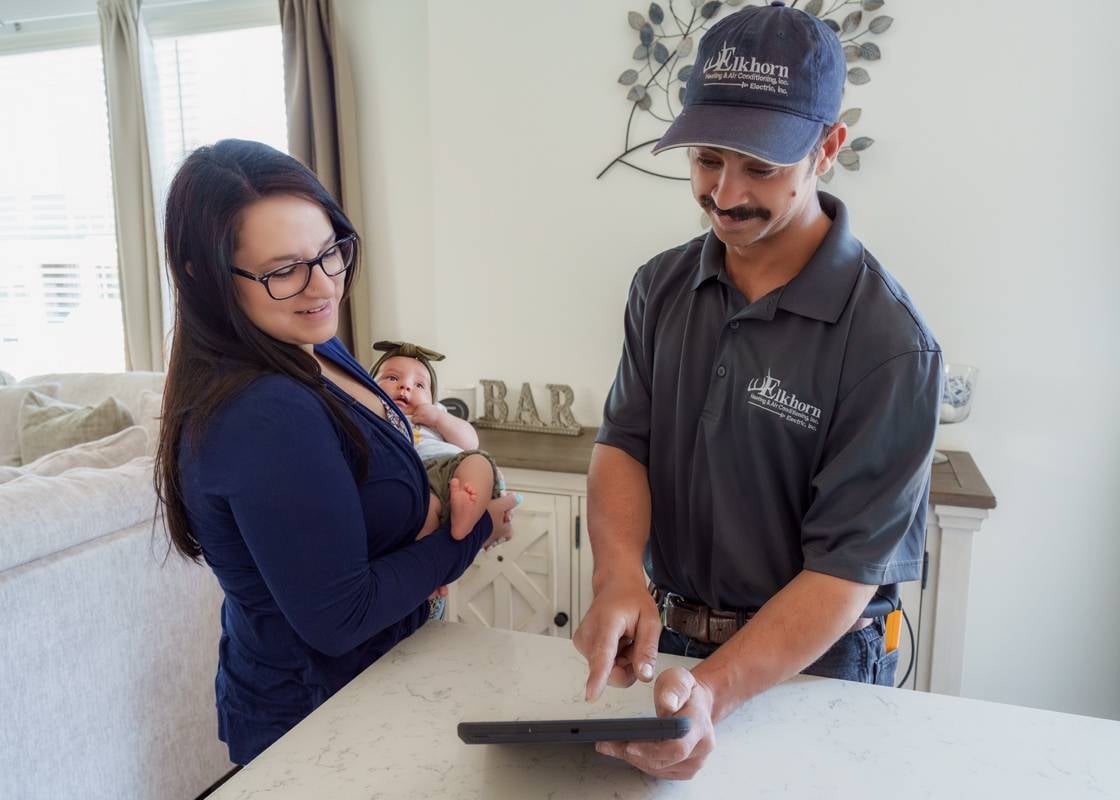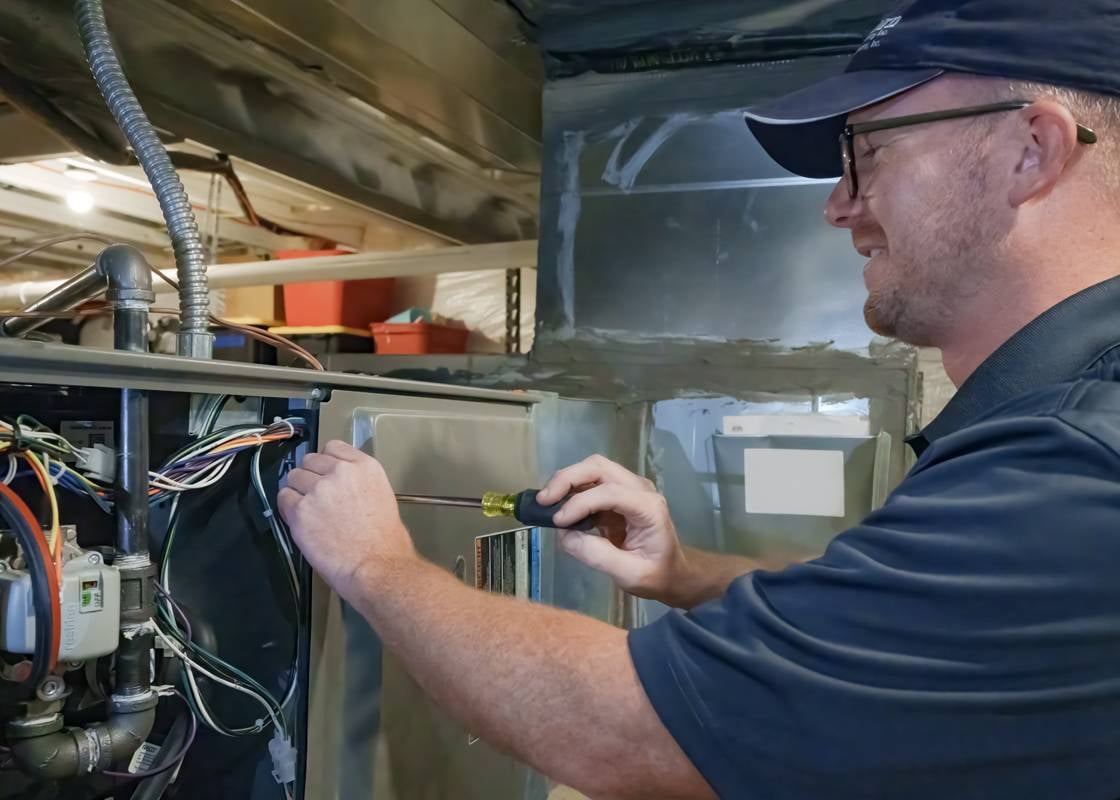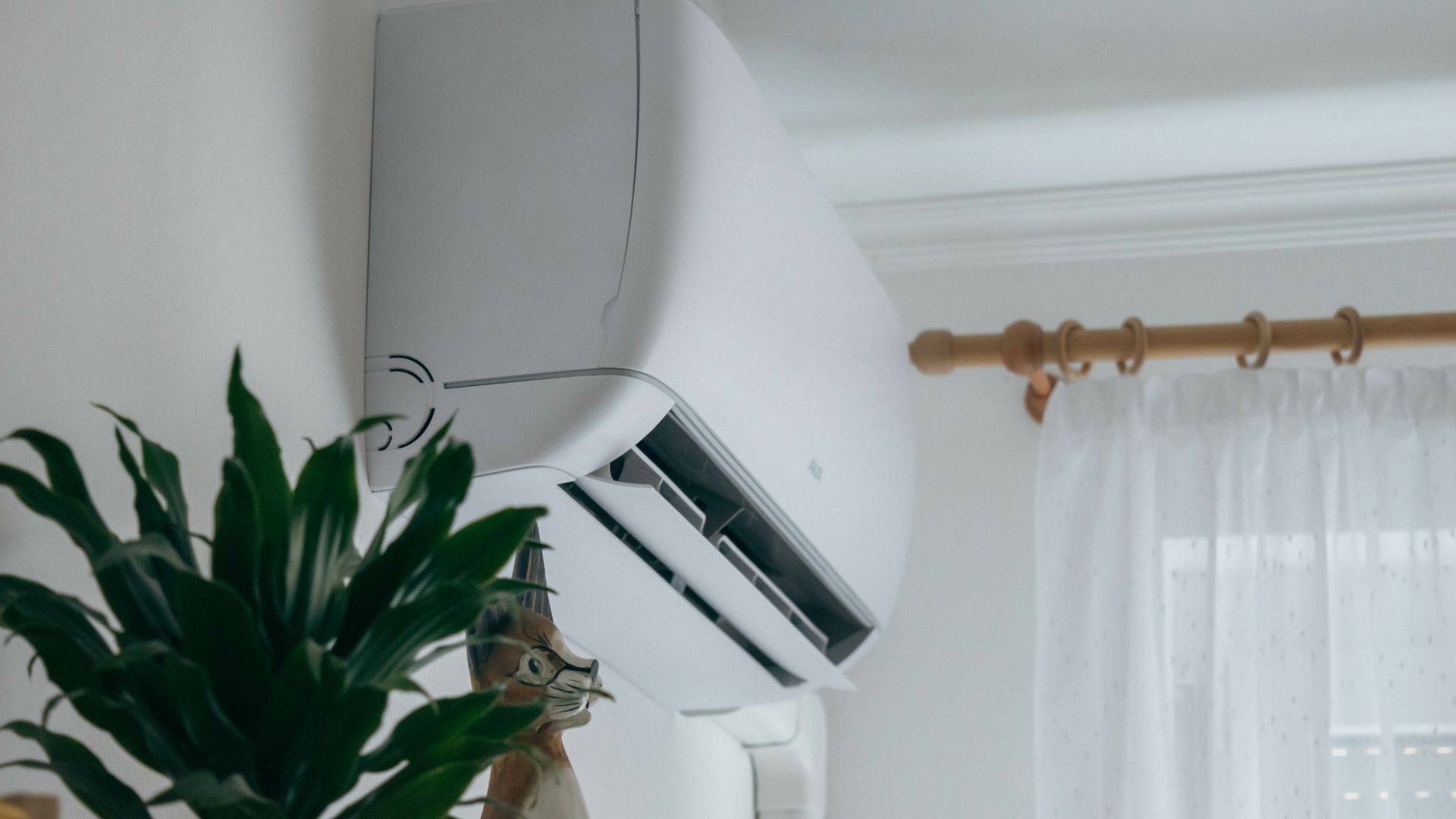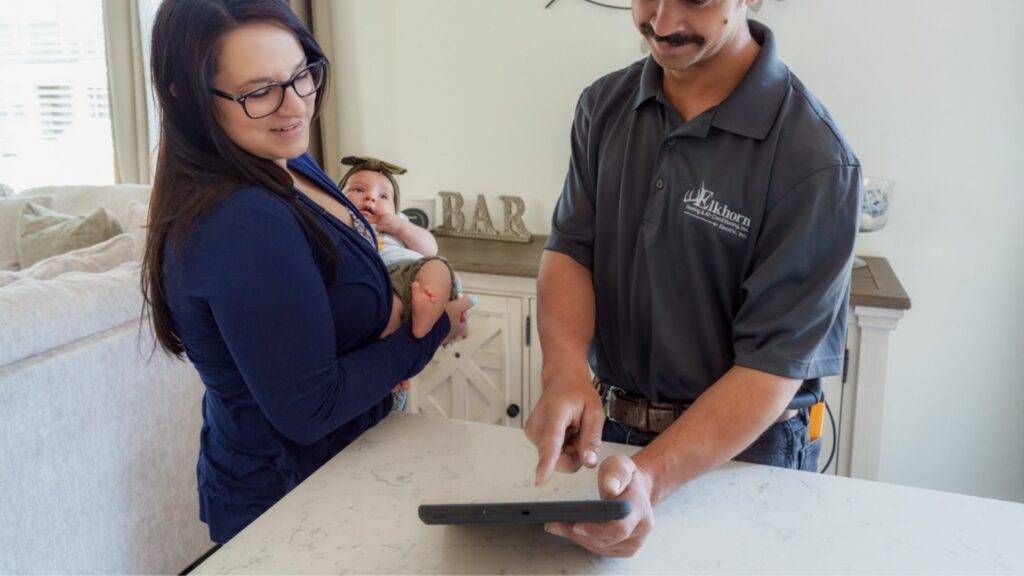During a typical winter in Denver, temperatures often range between highs of 46°F and lows of 17°F. This type of weather can be hazardous for your air conditioning system, which is why it is so important to learn how to winterize air conditioner units. Besides scheduling a maintenance check with Elkhorn Heating, Air Conditioning, Plumbing & Electrical, you should take a few simple air conditioner winter preparation steps. From investing in a cover to changing the filter, there are several steps you can take to winterize AC units in Denver.
Preparing Your Air Conditioner for Winter: A Complete Guide for Denver Homeowners
Although Denver has an arid climate, it can still get fairly cold in the winter. Because of this, it’s important to use the best AC winter care tips to protect your HVAC system. High-quality brands are designed to withstand the elements, but proper winterization will help your AC last longer.
Why Winterizing Your AC Is Essential in Denver
Your heating, ventilation, and air conditioning (HVAC) system is a finely tuned machine. Dust, vermin, and excess moisture can severely damage your AC. Denver typically averages around 56.5 inches of snow annually. If you don’t follow the best AC winter care tips, this snowfall can cause mold, mildew, and rust to develop.
Top Steps To Winterize Your Air Conditioner in Denver
The best time to winterize AC units in Denver is in early fall. During this time period, you don’t need heat and your AC can easily dry out after you clean it. Additionally, fall is normally when biennial inspections are done, so it is an excellent opportunity to get professional maintenance help.
Step 1: Clean and Clear the Area Around Your AC
If there are a lot of weeds and plants around the exterior unit, the plant matter can end up getting inside the air conditioner. You should remove weeds so that they don’t hold water and moisture next to your AC. If this problem isn’t remedied, your AC can develop rust, mold, and mildew.
Fortunately, this aspect of air conditioner winter preparation is fairly easy to fix. Before the weather turns cold, remove any plants or debris that are within 2 to 3 feet of the machine. You should also periodically weed around your AC throughout the year.
Step 2: Protect Your Unit With the Right Cover
As a part of your seasonal AC maintenance, you should cover your AC so that snow, rain, and pests can’t get inside your unit. However, you need to get a breathable cover that is explicitly designed for air conditioners. Denver receives a significant amount of snowfall, so the cover must allow moisture to leave. Otherwise, you’ll end up with mold growth.
During our AC maintenance inspection, we’ll talk to you about the best cover for your AC. Then, we can show you how to install it each winter so that your AC can enjoy the best level of protection possible.
Step 3: Adjust and Test Your Thermostat for Winter
Before you turn off your air conditioner for the winter, check your thermostat to make sure it’s working properly. When you carry out your Denver winter AC checkup, you should start by checking the AC mode. If it is set to the cooling mode, adjust the temperature so that it is cooler than the current air temperature in your home.
A functioning thermostat should immediately switch on to cool your home when it senses that the temperature is too high. If your AC doesn’t turn on, it means that there may be something wrong with the thermostat.
To troubleshoot problems, try wiping off the sensors to ensure the thermostat is sensing the air temperature correctly. If this doesn’t work, you may need to find the manufacturer’s instructions for resetting the thermostat.
After the thermostat is working properly, you can finish your AC winterization in Denver. When you switch the heat on, experts recommend keeping it at 68°F while you are home. When you’re asleep or away from home, you should drop the temperature to 60°F to 64°F to reduce the amount you spend on your power bill each month.
Step 4: Complete Any Necessary Repairs Before Winter
There are a few common signs that indicate you need to get your air conditioner repaired. For example, grinding, humming, and clanking noises indicate a major malfunction. If you notice unusual scents or an inexplicably higher energy bill, your air conditioner may have something wrong with it.
Fortunately, fall is an excellent time to get your AC repaired. Elkhorn Heating, Air Conditioning, Plumbing & Electrical can inspect your AC for necessary repairs and show you how to winterize air conditioner units. Then, we can ensure your cooling and heating system is fully functional before winter sets in.
Step 5: Insulate Your AC Pipes Against Freezing
Central air conditioners are designed with copper tubes that connect your outdoor unit to your indoor unit. Normally, these tubes carry refrigerant from one location to another to transfer heat.
As a part of the AC maintenance routine, you should wrap the pipe in insulation so that it is protected from the elements. This insulation can be secured using zip ties. Before it starts snowing, double-check your pipes to ensure they’re properly insulated.
Step 6: Schedule a Winterization Maintenance Inspection
If you’re learning how to winterize air conditioner units, start by scheduling a maintenance inspection. Our experienced HVAC technicians can address all of your questions during the inspection.
Additionally, we will inspect all of your HVAC components to ensure they’re in working order. As we look for signs of wear and tear, we’ll also lubricate components and check your refrigerant levels. Then, we can replace components, recharge your AC, and clean dirty parts as needed.
The maintenance inspection is also a useful time to bring up any concerns you have about your AC unit. We can quickly inspect the problem and provide the best solution possible.
Choosing a Maintenance Plan for Denver’s Cold Season
One of the most important Denver air conditioner maintenance tips is to sign up for a maintenance plan. With Elkhorn Heating, Air Conditioning, Plumbing & Electrical, you can enjoy taking part in our Whole Home Comfort Plan. With this maintenance plan, members receive VIP priority booking when scheduling their inspections, installations, and repairs.
At Elkhorn, we typically recommend that you get your HVAC system checked out in the spring and fall. Fall maintenance checks are perfect for preparing your furnace for the winter. Meanwhile, spring appointments ensure your AC is ready for the summer heat.
While two maintenance inspections are generally enough, older units may need more frequent inspections. During your first maintenance inspection, one of our certified technicians will discuss our recommendations for your home.
A good maintenance plan helps with air conditioner winter preparation. Additionally, it will provide a number of other important benefits.
- Warranties for labor and parts
- Special promotions and discounts
- Priority scheduling when you need repairs and maintenance appointments
- Flexible scheduling
- Appointment reminders
With Elkhorn Heating, Air Conditioning, Plumbing & Electrical as your partners in providing Whole Home Comfort, you’ll achieve peace of mind throughout every season. We’ll take care of the HVAC system in Denver, so you can relax and enjoy having a more comfortable home.
How Does Denver’s Winter Impact My AC’s Maintenance Needs?
During the coldest month of the year in Denver, you can expect average highs of 46°F and average lows of 23°F. This arid climate also gets an impressive 56.5 inches of snow each year, so it’s important to protect your HVAC system. Plus, the lack of humidity and winds necessitate special seasonal AC maintenance in Denver.
Protect Against Severe Weather
Denver sits 5,280 feet above sea level. Thanks to the dry air and high altitude, there may be sudden swings in temperature. Severe weather, like hail storms and thunderstorms, means you need to be extra careful about protecting your air conditioning unit.
Cold, Snowy Weather Impacts ACs
Denver gets a lot of snow year-round. Any type of precipitation can cause moisture damage and mold growth. When learning how to winterize air conditioner units, take some time to research different types of covers. You’ll want to find a breathable fabric so that moisture doesn’t remain trapped inside the AC.
Avoid Wind-Related Damage
When compared against cities in the rest of the United States, Denver has one of the fastest recorded wind gusts. To keep your air conditioner safe, you should remove debris from the area around the air conditioner. Additionally, a cover can prevent debris and dust from getting inside as well.
Why You Should Sign Up for an AC Maintenance Plan
While Denver’s weather can damage sensitive components, there’s an easy way to protect your AC. By signing up for an AC maintenance plan, you can get help with your AC winterization in Denver.
With a top-of-the-line AC maintenance plan, you can enjoy the following benefits.
Fewer Breakdowns
Denver’s winter AC checkup is important because it prevents repairs from becoming necessary. For example, our maintenance plan involves tightening loose components. If these components aren’t tightened, they can cause friction, grinding, and unnecessary wear. By simply checking your AC each year and performing a few essential maintenance tasks, we can prevent major breakdowns from happening.
Improved Convenience
You have a busy life and we totally understand. From family responsibilities to work obligations, you already have many different activities to worry about. Your HVAC maintenance doesn’t have to be another item on your to-do list. Once you sign up for our maintenance plan, you won’t have to call or schedule your air conditioner winter preparation. When the time comes, we’ll reach out and handle the scheduling for you.
Increased Longevity
If you take care of your air conditioner, it will last longer. Routine maintenance plans help you prevent repairs and ensure your components last as long as possible. By increasing your system’s lifespan, you can lengthen the time between each AC replacement and save a significant amount of money.
Better Performance
When the AC is well-maintained, it will have better performance and require less energy to function. This means you can enjoy a more comfortable home.
Enhance Energy Efficiency
While HVAC maintenance reduces your long-term repair costs, it can also lower expenses in the short run as well. Since an estimated 43% of the average home’s energy bill is devoted to heating and cooling costs, better energy efficiency can save you a significant amount of money in the long run.
Do You Have To Winterize Your AC Unit?
While you aren’t required to winterize AC units in Denver, it is generally a good idea to do so. AC winter care tips help to protect your AC from the elements. Snow, dirt, dust, leaves, and rain can damage interior components in your AC. Plus, the resulting mold, mildew, and rust can negatively impact air quality and the ability of your AC to function.
Additionally, winterizing your AC helps to reduce the amount of money you spend on energy bills and repairs. When your AC is properly maintained each year, you don’t have to worry about it breaking down unexpectedly. Over time, proper maintenance can help you ensure your air conditioner lasts for as long as possible.
Why You Should Hire a Certified Technician for AC Service
If you care about your air conditioner’s winter preparation, you need to hire a certified technician to do the work. A certified technician has the expertise, materials, and experience to care for your air conditioning unit. By using a professional, you can decrease the likelihood of repairs and save money on replacement costs in the long run.
- Peace of Mind: When you winterize AC units in Denver, your goal is to protect your unit and then forget about it. By working with a certified technician, you can be confident that your AC is well-maintained and ready for wintertime.
- Warranties and Guarantees: The majority of HVAC warranties require maintenance work and repairs to be completed by a professional. If you don’t hire a certified HVAC technician, you could end up voiding the warranty completely. At Elkhorn, we also warranty our own work and materials, so you can be confident that our repairs will fulfill your AC needs.
- Work Quality: When you work with our HVAC experts, you get a better quality of work. We are known for our craftsmanship, and our customer reviews attest to the quality of our results.
- High-Tech Equipment: Hiring a certified technician means you’ll have access to the latest equipment and technology. We go to industry conferences and continuing education so that we know all of the latest products and materials.
- Punctuality: Our team is known for their professionalism. We show up at the time of your appointment and quickly get to work. Our goal is to minimize the disruption to your life and your AC downtime as much as possible.
- Customer Service: Experienced HVAC professionals know how to provide the highest level of customer service. When you work with our HVAC technicians, you can rely on our courtesy and professionalism.
- Expertise: Certified technicians have been trained in all types of HVAC systems, so they can easily repair, maintain, install, and replace air conditioners and heaters.
- Speed: When you need HVAC maintenance, you don’t want to spend all day waiting for the technician to arrive. By working with our certified technicians, you can enjoy having fast, efficient repairs and maintenance work.
What To Do When Your Air Conditioner Breaks Down
Air conditioners always seem to break down at the most inconvenient time. When this happens, there are a couple of maintenance tips you can use to get your AC working again. If these tips don’t work, you’ll need to reach out to one of our professional HVAC technicians to get the underlying problem diagnosed and repaired.
Check Your Thermostat
One of the most important Denver air conditioner maintenance tips is to simply check your thermostat. Sometimes, a family member will feel cold and change the setting without mentioning it. If this is the case, all you have to do is change the thermostat’s mode or temperature setting back to normal.
Replace the Filter
An old, clogged filter slows airflow and can cause other components to become dirty. If this happens, it can lead to additional repairs and reduce your system’s performance. Fortunately, fixing the problem may be as simple as cleaning or replacing the air filter.
Inspect the Breakers
If there is an excessive amount of electricity, it can cause a breaker in your breaker panel to become tripped. Flipping the switch allows the power to resume. However, you should leave your AC off and call for help if the switch immediately flips again. When tripped breakers keep recurring, it indicates a different underlying problem that needs to be inspected and dealt with by a professional.
Call for Professional Help
Many aspects of your HVAC system are dangerous or hazardous to deal with. Electrical wires can cause electrical fires and electrocutions. Meanwhile, refrigerants are hazardous to the environment and human health. Because of this, you should never attempt complex repairs on your own.
If basic AC maintenance doesn’t fix your AC issues, it’s time to reach out for professional help. One of our experienced HVAC technicians can inspect your AC and tell you what the problem is. Then, we can recommend the best course of action. In the future, we can arrange for a Denver winter AC checkup so that you can discover problems before they grow out of control.
What Is Air Conditioner Maintenance and What Does It Include?
By working with Elkhorn Heating, Air Conditioning, Plumbing & Electrical, you can learn how to winterize air conditioner units and ensure your system runs at its peak performance level. When you arrange for one of our technicians to perform AC maintenance, you can expect them to go through the following process.
- Filter Changes: First, we’ll check to see if the air filter has been changed recently. Ideally, it should be replaced or cleaned every one to three months.
- Refrigerant Recharging: One of our staff members will check your refrigerant levels and recharge them as needed.
- Thermostat Inspection: Thermostats play a key role in sensing air temperature and telling your AC to turn on. During our maintenance inspection, we’ll make sure the thermostat is working correctly.
- Electrical Wiring and Connections: As a part of our maintenance check, we will tighten loose electrical connections and make sure your wiring is in good condition.
- Lubrication of Components: When components move against each other, they create friction. Over time, this friction can cause increased wear and more repairs. During our maintenance check, we’ll lubricate all of your AC’s moving parts.
- Clean and Inspect Components: Next, we’ll clean the condenser coils. This ensures you can winterize your AC without any dust and debris on the coils. Then, we’ll inspect your condenser unit, air handler, and other components to ensure they’re working properly.
- Final Tests: Before we go, we’ll conduct final tests to make sure your AC is working at its best.
By working with an HVAC professional on how to winterize air conditioner units, you can ensure your AC is prepared for the cold. Once the maintenance inspection is complete, you can relax in your comfortable home and enjoy Denver’s beautiful winters.
Get Expert Help Winterizing Your AC in Denver and Surrounding Areas
At Elkhorn Heating, Air Conditioning, Plumbing & Electrical, we know how to winterize air conditioner units and provide the best level of energy efficiency. Our experienced team of HVAC technicians offers top-notch assistance with AC repairs, maintenance, replacements, and installation.
Before winter weather rolls around, you should schedule a maintenance inspection. With proper AC maintenance, you can save money and avoid inconvenient breakdowns.
Learn more about the best air conditioner winter preparation by reaching out to our team of HVAC professionals today and filling out our online form.

